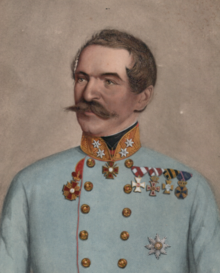Karl Baron of Urban | |
|---|---|
 Karl von Urban, circa 1857 | |
| Native name | Karl Freiherr von Urban |
| Born | 31 August 1802 Kraków, Kingdom of Galicia and Lodomeria, Austrian Empire |
| Died | 1 January 1877 Brünn, Margraviate of Moravia, Austria-Hungary |
| Allegiance | |
| Service | Imperial and Royal Army |
| Years of service | 1815-1865 |
| Rank | Feldmarschall-leutnant (Field Marshal-Lieutenant) |
| Commands |
|
| Battles / wars | Revolution in Sardinia-Piedmont
Second Italian War of Independence
|
Karl (Carl) Freiherr von Urban (English: Karl Baron of Urban; Hungarian: Báró Urban Károly; French: Baron Carl d'Urban; born 31 August 1802 in Kraków — died 1 January 1877 in Brünn) was an Austrian Field Marshal-Lieutenant celebrated for his daring tactics of lightning surprise attacks, often against much stronger forces, which earned him the epithet of Austrian Garibaldi.
He is particularly distinguished for his decisive actions during the Hungarian Revolution of 1848-1849, and his participation in the Second Italian War of Independence in 1859. Von Urban was the first commander to make a stand against the Revolution in Hungary, organizing the resistance and defending minorities. He captured Klausenburg, the capital of Transylvania, twice.